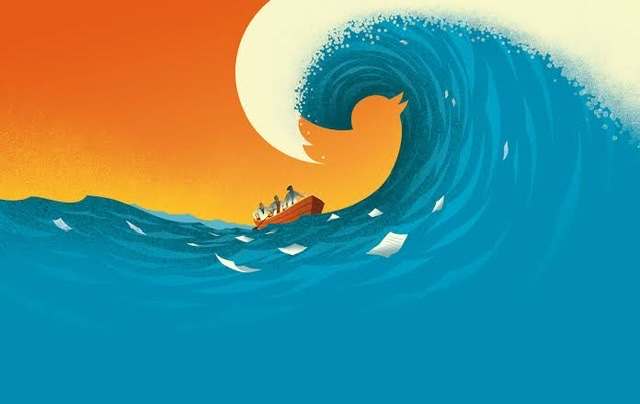Today’s essay is a slight deviation from my more philosophically oriented ponderings. It is a reflection on why it is problematic to think about technology, ownership and control in linear terms, despite our best intentions for a more democratic media space.
As Twitter undergoes a transition in majority ownership against a backdrop of public derision, anxieties over privatised corporate control over digital media and its implications on free speech have reached a crescendo. But if one is to unpack these concerns systematically, it becomes increasingly obvious that ‘control’ is perhaps too simplistic a word to capture what is a consistently shifting power dynamic between organisations, institutions and ordinary folk.
It is generally accepted that nestled behind all communication platforms, are human ideas, decisions and legislations guiding its operation, steering the ship away from choppy waters. From company board members to end-users, the entire medium thrives on human enterprise. But therein lies an inevitable paradox. Despite the granular levels of control and grandiose visions, there is a level of primitive unpredictability to how all media narratives/ideas flow.
For a start, there is no single predictor to how a news piece earns cultural relevance and social currency to impact tangible change. Some news stories flourish and gain virality while others flounder in an abyss of disinterest.
Informational credibility fluctuates depending on context and source. Nothing is permanently certain or cast in concrete, not even freedom of speech, which itself, as an idea, is subject to curious definitional changes, shifting moral benchmarks and cultural revisions, depending on the country and constitution in focus.
There are full of impersonal twists in a mediated universe driven by chance and chaos.
So where does this leave us?
We’re faced with an amplification of scattered bite-sized moments and stories, that, through the labyrinth of algorithms, become more visible and perceivably instructive in standing in for something that we think constitutes reality. These issues bulldoze their way right into our living rooms staking a claim to dominate our worldview.
But this ready acceptance of ‘reality’ is the biggest threat to our freedom, over and above any financially powerful individual or consortium. Because the freedom to think and speak isn’t just about who runs the show, it is also about how we, as discerning beings, react to it. Freedom is what remains when circumstance and interpretation are stripped of from our experience of life.
Whether it is Jack Dorsey or Elon Musk sitting atop the Twitter cathedral, surveying the digital landscape with a Macanudo cigar in one hand and glass of whisky in the other, we should be free to treat all media discourse with informed scrutiny and varying levels of acceptance. Because remember more often than not, these stories are pinholes rather than windows to reality.
Our true responsibility is to remain uncertain despite claims to certainty, free of the despotism of opinion and the addiction to rectitude. Seen in this way, we retain the uncomfortable luxury of changing our minds because there is no finality to any mediatised representation.
If anything, the polarised public reaction to Elon Musk’s ascension as majority shareholder of Twitter showed that we are too obsessed with potential whole-of-system fixers and disruptors. We are afraid of questions and cracks that linger for too long. Put simply, we prefer to know at all costs even if such a pursuit presents half-baked truths and skewed assumptions.
There is no epistemological certainty that Twitter will, under the stewardship of Elon Musk, become a shining beacon for free speech or wilt under the influence of corporate privatisation. As far as precedents go, it has traditionally been somewhere in the middle, toying the fine line between enriching debate and overzealous moderation. But nuance is anathema for those seeking monochromatic and clear-cut explanations. So we gravitate to best case and worst case scenarios.
Just like Copernicus showed us there was nothing privileged about our position in space by debunking the view that the earth is all there is to the universe, there is also nothing privileged about our cognitive landscape. We are not the ultimate purveyors of knowledge despite mans’ ability to control, manipulate and politicise information and news. More often than not, we’ve got no idea of what will eventuate both in our personal lives and more broadly in the world.
Instead of a system where knowledge is equated with accumulation and where ignorance is rarely discussed, we must explore the edge of the widening circle of uncertainty and how the news around us frames the unknown. We must think in questions rather than in answers. It was W. B. Yeats who once exclaimed that ‘education is not the filling of a pail, but the lighting of a fire’. Elon’s majority ownership of Twitter isn’t the death or resurrection of free speech. It is simply a cautionary reminder that reality is multifaceted and so should our cognisance of it.




Josh, I was going to forward this to you but could find how. Have you seen this piece by Charlie Warzel from earlier this morning? https://newsletters.theatlantic.com/galaxy-brain/
Uncertainty is so unsettling for us as a group, isn’t it? I struggle with that every day - trying to live without forming a conclusion that would, in any case, be wrong most of the time. In other news, I wanted to share this link with you from Courtney Cook who had a take I think you might appreciate: https://courtneycook.substack.com/p/elons-not-the-problem-we-are?r=1dh03&utm_medium=ios